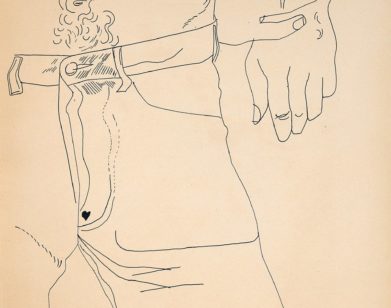Slutever’s Karley Sciortino is confronting the shame surrounding sex
Reading tarot cards feels supremely millennial. The practice is in the same category as astrology, which has become fodder for both disturbingly earnest discussion and sad girl memes on Instagram. But my friend Brooke reads tarot cards, and so we’ve shown up at Slutever blogger and Vogue.com sex columnist Karley Sciortino’s apartment to give them a whirl. “I feel like I’m an aggressively rational person to a point that it cockblocks my ability to enjoy the fun of things, like astrology and tarot and stuff like that,” says Sciortino. But she lets Brooke do it anyway.
In tarot, Brooke uses a spread called the Celtic Cross, where cards—which look like sincere Stevie Nicks fan art—are divided into a cross made of six cards, and a “staff” of four. Each card symbolizes a different concept, and while every tarot reader is different, Brooke says she likes to look for a pattern in the cards that reveals something someone might not have realized about themselves. The subject of a tarot reading is also supposed to come up with a question that they can apply to the entire process—and at the moment, Sciortino is promoting her new book, Slutever: Dispatches from a Sexually Autonomous Woman in a Post-Shame World, and a new Viceland TV show, also titled Slutever. Sciortino knows how to stay on message, and so her question involves her work. “I’m thinking about writing about sex in 2018,” she says. “I’m wondering about the message around sex in these projects, how they’ll be received, and if that message is going to translate.”
Over the course of the reading, two cards in particular stood out to Sciortino (both merited the response, “That’s actually true”). The first, the Five of Pentacles, is defined as a symbol for “dissonance in marriage and obstacles to resolution in personal relations.” Brooke applied it to Sciortino’s writing. “With your mission in mind, the goal of your challenge is to get more general,” she tells Sciortino. “To make it less about you.”
The other significant card, Judgement, represents a “growing awareness shift in personal conscience towards union with the universal.” As Brooke put it, “It’s a nice card to get given that you want to change what people think.”
Despite Sciortino’s aggressive rationality, the reading did resonate with her. “For years I wrote a personal blog, an overshare, TMI diary about my sex life,” she says. “I think what’s cool about the tarot is that the show now is telling other people’s stories, and the book is trying to redefine the idea of the slut.”
Slutever, the TV show, stays true to those themes. Sciortino describes the show as a journalistic endeavor where she acts as more of a voyeur, serving as a conduit for others to share. She runs around “I couldn’t help but wonder”-ing all over the country, interviewing subjects with a fluffy pink microphone like a nympho Diane Sawyer. The episodes are both informative and good-humored. An installment exploring “lifestyle slaves”—getting one is a great lifehack, someone alert BuzzFeed—opens with Sciortino painting her toenails. “Ugh, life is so hard,” she says. “Between meeting my blog deadlines and performing my gender, I barely have time to get anything done!”
The book is more of a memoir, albeit one that makes a case for more women to embrace their inner Nelly Furtado. The current news cycle is an unrelenting hurricane of sexual assault stories, so reading Slutever felt like breathing in Byredo perfume after a lifetime of Axe body spray—it is a spry, rebellious, and deeply hilarious examination of the joys and absurdities of being an unrepentant slut.
One of Sciortino’s many gifts is shifting the tenor of the current popular discourse; she tells stories that show men as needy and emotional, with women in positions of power. Despite a fuck buddy’s pronouncement that Sciortino is “the purest sociopath,” even her most ridiculous stories are relayed with sensitivity. Some favorite excerpts include: a BDSM slave who was snotty about the conditions of a crab terrarium; a man who asked Sciortino to come to a graveyard at midnight to stick a meat thermometer up the ass of a Russian corpse; and the tragic tale of “Book Bitch,” a money slave who got off on buying Sciortino books online.
Essentially, Sciortino is able to poke fun while retaining respect for her subjects’ humanity; for example, she can articulate the emotional benefits of BDSM while still asserting how the subculture’s aesthetics—red thrones, tiny black bangs—remain staunchly cheesy (she lovingly calls members of the community “freaks with bad style”). And in case you’re concerned that her material leans too far into the gender binary, let it be known that Sciortino is attentive to the experiences of trans and non-binary people; additionally, much of the book focuses on her first queer relationship. She also explores concepts of sex and ability—a chapter on what’s beyond penetrative sex is as moving as it is revelatory.
Sciortino is especially interested in the concept of female sexual agency. She has described herself as a “libertarian sex-radical feminist”—one whose heroes include Madonna and tendentious social critic Camille Paglia, both of whom, like Sciortino, grew up in conservative Catholic Italian-American families. All three live to provoke—Sciortino says she likes to “troll society”—and some readers, especially post-#MeToo, may rankle at Slutever’s “slut manifesto,” an introduction that acknowledges the reality of sexual assault while entreating women to move away from victimhood.
“I’m more pro-slut than pro-victim,” says Sciortino. “I think that there are dangers in this newly emerging victim feminism where we talk more about how sex can hurt you rather than how sex can be empowering, and how to position yourself to be strong and have sexual experiences that are autonomous and positive. And a negative sexual experience doesn’t mean that you’re broken, it just means that you’ve learned something about yourself and you know not to go there again.”
In her personal life, Sciortino is “drawn to sexually powerful or sexually promiscuous or sexually interesting women.” Her work feels like a paean to those women—much of her most interesting material involves her experience in sex work, and she manages to write love letters to sugar babies and dominatrixes while simultaneously interrogating her own privilege in the industry. (The Slutever show flips the narrative and shows Sciortino exploring sex work as a customer—in the premiere, she searches for a happy ending, or, as she puts it, “the transactional orgasm of my dreams!”) As her tarot reading implied, her newer work explores the richness of a wide range of life experiences gained through slut-hood; it’s like Oh, the Places You’ll Go, but with piss play.
“It’s about redefining the idea of the slut as less of a pejorative term, reclaiming it to be a symbol of power, and agency, and autonomy,” she says. “A slut is a sexually activated person, a slut is a sexually activated woman, a slut is a person who seeks out visceral experiences through sex and is not ashamed about how or why they want to fuck who they want to fuck.”
Sciortino points out that men don’t have the expectations of being “good”—innocent, clean, protected—in the same ways as women. She likes the idea of a woman being in control of a “fun and adventurous and provocative and taboo” sex life. The “slut” identity should be less vilified, but perhaps no less transgressive.
“The goal isn’t to be good,” says Sciortino. “The goal is to be free.”
SLUTEVER: DISPATCHES FROM A SEXUALLY AUTONOMOUS WOMAN IN A POST-SHAME WORLD (GRAND CENTRAL PUBLISHING) IS AVAILABLE FEBRUARY 6, 2018. SLUTEVER IS OUT NOW ON VICE.







